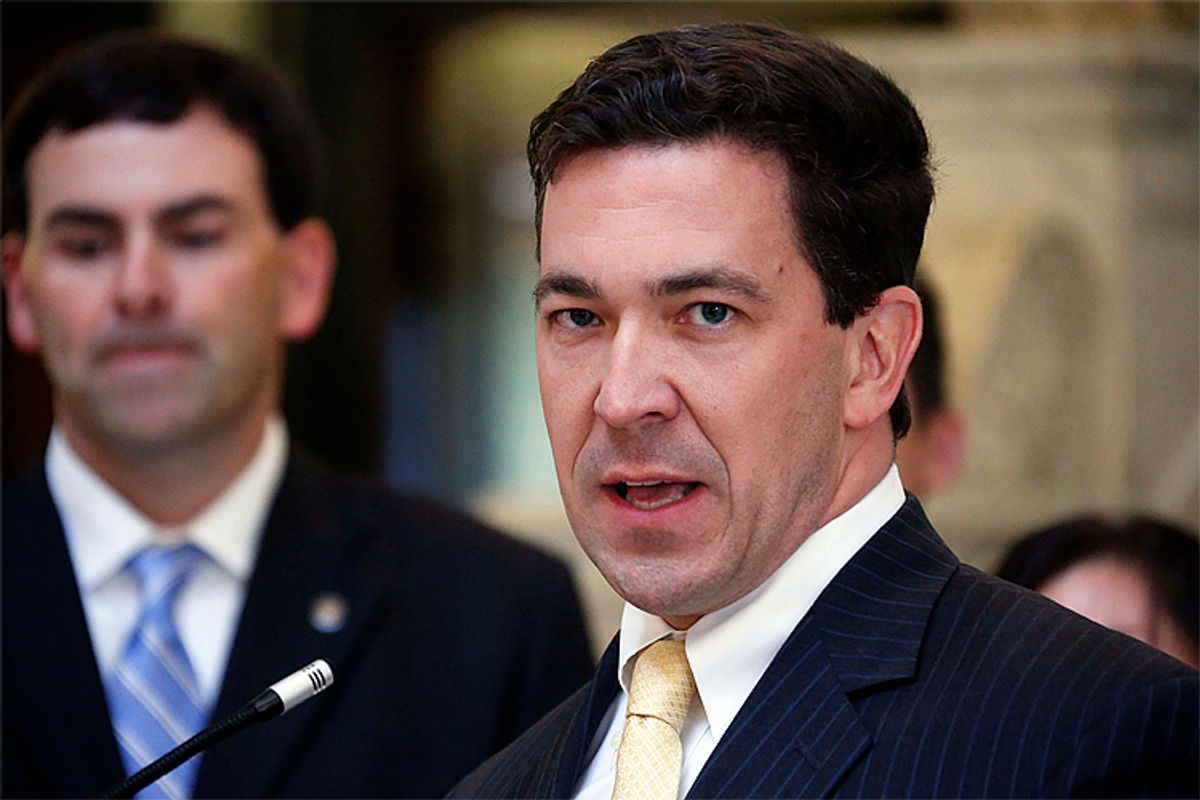And so the story of primary season 2014 comes down to Mississippi. Who will win Tuesday's Senate primary? Will it be an incumbent backed by well-funded groups based out of Washington, or will it be a challenger backed by well-funded groups based out of Washington? Will it be a far-right-wing candidate who's old, or a far-right-wing candidate who's younger? Will it be a candidate who won't back bipartisan, comprehensive immigration reform, or a candidate who won't back bipartisan, comprehensive immigration reform? Such critical distinctions there are between Sen. Thad Cochran and challenger Chris McDaniel, on which the course of United States politics won't hinge.
The polling in Mississippi's Senate primary has been surprisingly sparse for what pathetic junkies with no life, such as myself, consider to be the hottest race in the country. A slew of new polls (albeit from partisan outlets) over the weekend, however, show the race to be tied, according to the latest RCP average.
What's at stake here? Let's just say we have a hopeful take and a cynical take.
The hopeful take is that if the "Establishment," as in groups like the Chamber of Commerce and the Republican Party committees, can prevail by delivering Cochran a seventh term, the "Tea Party" primary threat will have been summarily defeated, and the "Establishment" will find itself in a new Congress with more leeway to compromise on legislation. The New York Times outlines this view here:
The most significant effect of the party turnabout could take place well before 2016, though. If Republicans now in office conclude that Tea Party pressure is no longer a political threat, they may be more willing to face down the right on issues like an overhaul of immigration laws.
“If the threats are toothless, then the scorecards are meaningless,” said Mr. Barbour, referring to the closely watched voter guides issued by many conservative groups.
The key part of this "may be willing" phrasing is the "may" part, however. Because the "Establishment" doesn't have a whole lot to be proud of with the manner in which it's staving off challenges. Should Cochran win, it's not as if he will have done so by taking moderate stands and then successfully defending them against a challenge from the right. If he wins, just as Mitch McConnell won, it will be because he voted and campaigned consistently far to the right ahead of the primary. Had he, or McConnell, broken with the right at any point in the last couple of years, defended those stances on the campaign trail, and then survived to see another day, the primary victories would be seen as validations of those postures and have given them more leeway to continue apace. Instead they will have won by denouncing the Senate's bipartisan approach to, say, immigration reform. Who's to say that if they return to the Senate and discard the hard-line approach -- as Mitt Romney and the Chamber of Commerce would hope -- they wouldn't be challenged again down the road, and this time with real ammunition?
The more cynical take is that this peak "Tea Party vs. Establishment" proxy fight in Mississippi is about which Washington groups can deliver the good news to its set of big-pocketed donors and enhance its budget.
Senator Ron Johnson, of all people, candidly laid out the dynamic to reporters at the otherwise-insane Republican Leadership Conference in Louisiana this weekend. From the Daily Beast:
“I value the membership of the Tea Party movement. I am right there with them ideologically, I mean, ‘Taxed Enough Already.’ But the groups don’t necessarily represent all of the individuals in the movement. I think the individuals are now realizing they may have been led astray by an individual group or two and they really do understand that they have to win elections,” he said, adding, “My guess is the Tea Party grassroots are maybe a little more flexible.”
Johnson also accused Tea Party groups of bashing the GOP establishment to raise money.
“That is a fact. It is not a conjecture, and so many of these groups it is basically donor capture. They are there to perpetuate themselves.”
We'd quibble with the idea that the "Tea Party grassroots are maybe a little more flexible," in terms of policy. They're more flexible in terms of candidates -- as in, at this point, they don't seem to care which candidate they get, as long as that person gives lip service to every conservative bugaboo that's on their minds. Had a Cochran or a McConnell voted for Dodd-Frank or whatever, there's no question they'd be trounced.
What Johnson says about "donor capture," though, is completely correct. Groups like FreedomWorks, the Senate Conservatives Fund, and the Club for Growth are, indeed, "there to perpetuate themselves." And it's going to be harder for them to meet payroll if they come back to their donors empty-handed at the end of primary season. That's all.

Shares